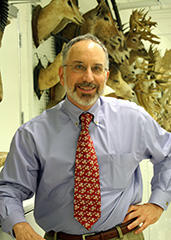Engaging students via field trips, near and far
This post is republished from Into Practice, a biweekly communication of Harvard’s Office of the Vice Provost for Advances in Learning.
 James Hanken, Professor of Biology and Director of the Museum of Comparative Zoology (MCZ), increases student engagement by taking students out of the traditional classroom. Whether organizing hisfreshman seminar around weekly excursions to Harvard’s museums, or guiding a spring break field trip to Costa Rica for undergraduates enrolled in OEB 167 Herpetology, these immersive experiences “provide opportunities for students to see and understand things they simply won’t get in the classroom.”
James Hanken, Professor of Biology and Director of the Museum of Comparative Zoology (MCZ), increases student engagement by taking students out of the traditional classroom. Whether organizing hisfreshman seminar around weekly excursions to Harvard’s museums, or guiding a spring break field trip to Costa Rica for undergraduates enrolled in OEB 167 Herpetology, these immersive experiences “provide opportunities for students to see and understand things they simply won’t get in the classroom.”
The benefits: While Hanken favors the traditional lecture for certain material, field trips expose students to people and ideas unavailable in the classroom setting, like interviewing museum directors about the challenges of curation and exhibit administration. The field exposure in Costa Rica, a trip largely sponsored by the MCZ, gives students an understanding of animals as living organisms, not just static entities—an immersive experience “we are uniquely qualified to offer.”
The challenges: Hanken and his OEB 167 colleague Jonathan Losos experiment with assignments and itineraries in an effort to strike the right balance of structured and free time abroad. “Despite advance planning and deliberation, a lot of the success is due to trial and error.”
Takeaways and best practices
- Student-driven assignments augment experiential learning. Hanken requires students to submit interview questions for museum directors, and short video essays describing an assigned species, in advance of excursions to increase their engagement with the content and their investment in the experience.
- Shared experiences promote deeper engagement. Whether touring museums behind the scenes or getting caught in an unexpected tropical rainstorm, shared moments personalize the learning experience: “Many students who take lecture-only courses don’t even know one another’s names, let alone bond. Ditto for the instructor.”
- Don’t overlook the logistics. Hanken relies on University policies and resources to coordinate travel for two-dozen students and distributes critical itinerary information and emergency protocols via the course website to aid advance preparation. His unrelenting attention to fighting off mosquitos earned him the nickname “Dr. DEET.”
Bottom line: Hanken’s field trips are inspired by his own scholarship (“I get to learn a lot”), but also his role as an educator: “These students stand to hold influential positions in the future. Whether or not they change their career trajectory based on these immersive experiences, they gain an understanding of an area of study they may not have otherwise.”

